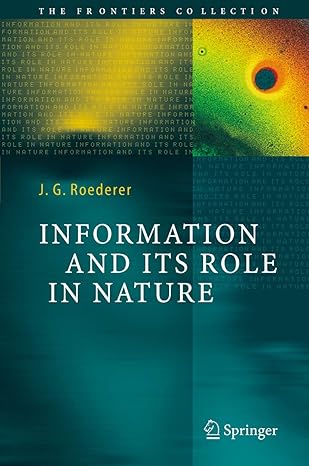 Information and Its Role in Nature (The Frontiers Collection)
Information and Its Role in Nature (The Frontiers Collection)
by: Juan G. Roederer (Author)
Publisher: Springer
Edition: 2005th
Publication Date: 23 May 2005
Language: English
Print Length: 247 pages
ISBN-10: 3540230750
ISBN-13: 9783540230755
Book Description
Information and Its Role in Nature presents an in-depth interdisciplinary discussion of the concept of information and its role in the control of natural processes. After a brief review of classical and quantum information theory, the author addresses numerous central questions, including: Is information reducible to the laws of physics and chemistry? Does the Universe, in its evolution, constantly generate new information? Or are information and information-processing exclusive attributes of living systems, related to the very definition of life? If so, what is the role of information in classical and quantum physics? In what ways does information-processing in the human brain bring about self-consciousness? Accessible to graduate students and professionals from all scientific disciplines, this stimulating book will help to shed light on many controversial issues at the heart of modern science.
About the Author
Review From the reviews:Paul Davies, in Australian Physics Vol. 42 (5), 2005:This well-written and engaging book reviews the way information is used in its many and varied contexts, from quantum particles to human discourse. The level is introductory, and the treatment is fairly informal. The mathematical treatment is liberally interspersed with conceptual and even philosophical discussion, making it pleasing to read. Quotes from David C. Krakauer, in Artificial Life:…it presents the hypothesis that information is the defining feature of adaptive systems, like the nervous system and the genome, and that it is not Shannon’s formulation that we need in order to understand life, but a pragmatic information concept that captures semantic or functional properties of communication.…in addition to providing background in cosmology, computation, and information, it endeavors to provide a conceptual framework based on the concept of information to organize a range of physical phenomena.…a great number of ideas have found their way into this book―the scope of interests spans field theory, genetics, and neuroscience. I think these ideas are central to our understanding of the adaptive portion of the universe.The effort at synthesis is interesting and redefines an important vector we need to remain aware of in the space of scientific research.Quotes from P. Jouvelot, in Computing Reviews:I really enjoyed reading this book, which tackles a very interesting and quasi-philosophical subject. Roederer packs a huge amount of information into a very reasonable number of pages.As computer scientists are concerned, anyone interested in data compression issues, information theory, the emergence of consciousness, and the relationship between physics and theoretical computing, or artificial intelligence,will gain from Roederer’s vast experience and knowledge.Alexandr S. Holevo, Zentralblatt MATH, Vol. 1085, 2006″The book presents an in-depth interdisciplinary discussion of the concept of information and its role in the control of natural processes. … The presentation is intended to a wide audience, from graduate students to specialists in different scientific disciplines, is stimulating and helps to shed light on several controversial issues of the modern science.”André Hautot, Physicalia, Vol. 28 (4-6), 2006″The book presents an interdisciplinary discussion of the concept of information and its role in the control of natural processes. … the book is very well written and well illustrated with 35 figures. Further, the text is fully accessible to graduate students and professionals from all scientific disciplines. … this stimulating book provides a very good starting point for discovering the fascinating world of information in science. It is suitable for a wide readership … .” (André Hautot, Physicalia, Vol. 28 (4-6), 2006) From the Back Cover Infromation and Its Role in Nature presents an in-depth interdisciplinary discussion of the concept of information and its role in the control of natural processes. After a brief review of classical and quantum information theory, the author addresses numerous central questions, including: Is information reducible to the laws of physics and chemistry? Does the Universe, in its evolution, constantly generate new information? Or are information and information-processing exclusive attributes of living systems, related to the very definition of life? If so, what is the role of information in classical and quantum physics? In what ways does information-processing in the human brain bring about self-consciousness? Accessible to graduate students and professionals from all scientific disciplines, this stimulating book will help to shed light on many controversial issues at the heart of modern science. About the Author Juan G. Roederer is professor of physics emeritus at the University of Alaska-Fairbanks, and adviser at the Abdus Salam International Centre for Theoretical Physics. 1952 DSc. University of Buenos Aires; 1966 professor of physics at that university; 1967-1977 professor at the University of Denver, Colorado; 1977-1986 director of the Geophysical Institute of the University of Alaska, then professor until 1993. Research fields: space physics, psychoacoustics, information theory and science policy; author of over 250 articles in scientific journals. His books “Mecanica Elemental” (Eudeba, Buenos Aires), “Dynamics of Geomagnetically Trapped Radiation” and “Physics and Psychophysics of Music” (both at Springer-Verlag) are ‘classic’ university textbooks in their fields; the latter was translated into German, Spanish, Portuguese and Japanese. Roederer is a member of the Academies of Science of Austria, Argentina, and the Third World Academy of Sciences.Aus den Rezensionen:”… eine Buchreihe … Begründet und redaktionell betreut von Physikerin Angela Lahee, hat sie das Ziel, den Lesern eine Erweiterung und Reflexion der eigenen Wissensgrenzen zu ermöglichen. … Die zentrale Rolle der Information in der Natur – Quantentheorie, Biologie, Genetik und Hirnforschung – erörtert der Physiker Juan G. Roederer … außerordentlich lesenwert. ‘was wir brauchen, ist nicht der Wille zu glauben, sondern der Wille herauszufinden‘ … Die interdisziplinäre, unkonventionelle Frontiers Collection … hat ihn sogar zu ihrem Leitspruch erhoben.”(Rüdiger Vaas, in: Naturwissenschaftliche Rundschau, 2007, Vol. 60, Issue 4, S. 212 ff.) Read more
未经允许不得转载:电子书百科大全 » Information and Its Role in Nature (The Frontiers Collection)

